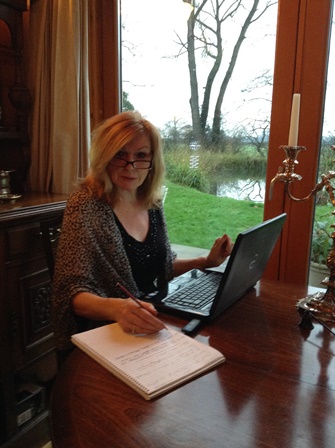Author Elizabeth Jackson discusses the art of letting go, and why doing so could help you beat your writer's block.

This advice was given me by a celebrated author a number of years ago: always write about what you know and ensure your characters are larger than life. His advice made sense then and does today - so that it is what I try to do.
Having been raised in the settled community, yet born half gypsy, I found I could draw on this experience in my writing - it proved a godsend. It awarded me with the knowledge of two cultures; one of which continues to intrigue - and at times - exasperate the non-gypsy community.
In all honesty, I believe it’s impossible for a non-gypsy to gain access into the gypsy community. It’s not like a religion one can convert to; it is a closed society - to all but their own. One cannot become a gypsy or traveller - and although some may adopt the lifestyle, they will remain for ever on the outside looking in. You have to be born one to gain access and have genuine Romany blood coursing through your veins. So, with this in mind, being well acquainted with my subject and having an abundance of material to hand allowed me to write about the gypsy fraternity with comparative ease.
The first thing I did before starting on my first novel, Language of Thieves, was to dig out my late mother’s old family photographs. I needed to carefully study and absorb these strange, unconventional looking characters; all smartly dressed and seated by a camp fire. My mother’s relatives always fascinated me as a child. I loved it when they would visit us in their horse drawn, bow-top wagon, when passing through our village en route to one of the gypsy fairs in high summer. And it was while gazing at these photographs, the stories my mother divulged years ago resurfaced; and I was entranced… and lured into a Romany world of romance and make-belief.
From the initial outset when writing my first book, the story spilled out onto the pages quite effortlessly; so effortlessly in fact that I found myself holding back on a number ideas and certain phraseology, thinking to myself, I’ll save that for the next book. Needless to say, with this reckless rationalisation, and only a few pages along, I began to struggle – and so did my characters.
It wasn’t too long before it dawned on me what the problem was. I was incredibly shy; and fearful of giving rein to my imagination; afraid of permitting total release from conventional thinking; allowing the characters I’d created to tell the story how they wanted it to be heard. Also, I have to admit, even though it was a work of fiction, I was worried to some extent what people might think. Thoughts of strangers, and people I knew, being privy to my imagination plagued me; especially when writing romantic sex scenes. It was then that I’d waver or try to reword it… or I’d change it completely.
Despite all this going on in my head, I knew if I wanted to become a real writer, I’d have to take myself in hand and overcome this ridiculous storytelling shyness one way or another. It became vital that I severed all restraints that held me back.
I managed to achieve this, by making a conscious decision of the mind and commitment of the will, to give my absolute all to my writing, without constraint. And secondly, I’d not share my writing with anyone unless I was published.
Much to my relief, after taking these important decisions, my imagination was liberated. At last I was able to write freely without inhibition crippling my creativity - and my characters, no longer shackled to the confines of my mind, took flight.
I sometimes wonder if other writers find themselves in a similar situation of feeling stuck; shy, fearful that others might view them differently now they’ve exposed themselves… their imagination out there for all to judge. And could this be why, from time to time, we can experience what is commonly known as writer’s block? Or, as in my own case, the fear of letting go.
Elizabeth Jackson was born and has lived in North Yorkshire all her life. She was a mobile hairdresser for many years before training to be a psychotherapist; a profession that remains very close to her heart. Elizabeth didn't begin writing her first novel Language of Thieves until she was in her fifties, even though she'd carried the title in her head since she was 11 years old. Her second novel, Kicking Over The Traces, was released in October 2015 to which she is currently writing a sequel. Elizabeth is married and has two sons and three grandchildren. Find out more on her website and follow her on Twitter @ejacksonauthor .
Comments